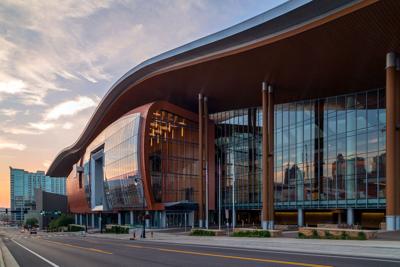Power struggles between the dominantly Republican Tennessee General Assembly and the left-leaning Metro Nashville government are nothing new. But a recent spate of legislation at the state Capitol seems to indicate that conservative legislators are willing to take the battle to places it has never been before, with the potential for harmful fiscal consequences.
A number of bills have been filed during this legislative session that seem to have the express purpose of retaliating against Nashville for the Metro Council’s rejection of hosting the 2024 Republican National Convention. One such bill aims to cut the council in half, one aims to take control of Metro’s Sports Authority and Airport Authority, and yet another would eliminate local runoff elections. The latter, which would let a plurality of votes determine an election’s winner rather than a majority, could open up a pathway for a conservative to win Nashville’s mayoral race.
“During my years in the legislature, there are always areas of cooperation, but also definitely conflict between the state and Metro,” says Sen. Jeff Yarbro (D-Nashville). “The danger and volume of threats and conflicts this year is unprecedented and moves beyond the political to the financial and economic stability of both the city and the state.”
One particularly disruptive bill aims to cut Metro’s so-called privilege taxes, which place an extra sales tax on areas and services heavily trafficked by tourists. These taxes are largely used to pay off bonds that funded the Music City Center. But with tax collections in the area surpassing expectations, MCC and Metro leaders have in recent years sought to redirect some of the excess funds to other uses in the city.
It’s unclear what the effects of such a bill could be. Financial experts have weighed in, lamenting the plan as mutually destructive, saying it could cause damage not only to Nashville’s bond rating, but also the bond ratings of cities statewide.
“Honestly since no such thing has ever happened, it’s very hard for any of us to know the full extent of what this will mean,” former Nashville Mayor Bill Purcell tells the Scene. “But there is no question that it puts a significant instability into not just the governance of this city, but the governance of all cities and the future of the state.”
Purcell and Metro Councilmember At-Large Bob Mendes are less concerned with the potential for damage to bond ratings and more concerned with other implications of this legislation. Mendes explains that as part of the deal to fund the convention center, Metro promised to back up the bonds in case of a scenario such as this one — so regardless of where the funding comes from, those bonds will get paid.
“Most likely property taxes would have to go up to cover the shortfall,” Mendes tells the Scene. “So I think bonds will get paid, but it’ll be a direct impact on Metro taxpayers paying for it directly rather than having these dedicated revenue sources to pay for it.”
Since the legislation’s initial introduction, Republican leadership has indicated that the bill will likely need to be changed due to legal issues. Contracts were signed, and cutting this revenue source could be a breach of those contracts. State House Speaker Cameron Sexton (R-Crossville) has hinted that rather than cut the funding, the General Assembly could instead take control of the revenue and decide for itself how money not spent on the convention center could be allocated.
“That’s not nearly as egregious as us losing out on $80 million a year of revenue,” says Mendes. “But that’s still $25 million a year that we’ll have to find a different way to cover.”
The plan used to fund the convention center is similar to the funding plan being proposed for a new Titans stadium. Mendes points out that the willingness of the state’s Republican supermajority to play with that funding stream as part of a power struggle should give Metro pause about pursuing similar projects.
“The state has pulled the pin on a substantial grenade,” says Mendes. “A major premise of the argument from the mayor’s office for a new stadium has been using these revenue streams, and now we’re seeing that may not be reliable.”
In an increasingly politically polarized country, feuds between city and state governments are becoming more aggressive. The GOP has begun searching for a city to host the 2028 RNC, and some have speculated that the Metro Council could put in a bid to host the event in an attempt to mend Nashville’s relationship with the state. But Mendes says it will take a lot to make things better, and Purcell believes there’s much more at stake than the city’s finances.
“I think from a practical standpoint and a political standpoint, the question is the control of the destiny of the city,” says Purcell. “And obviously, at its core, this is an effort that diminishes and perhaps removes the city’s ability to both take care of what we have and also plan for the future.”





